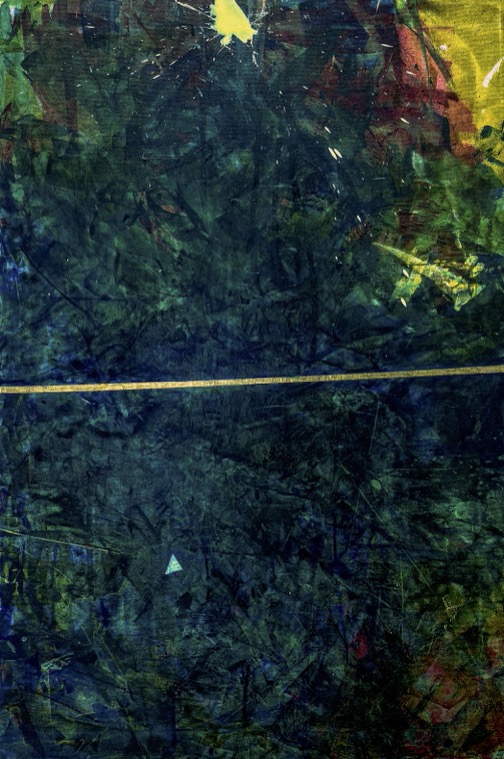The Word for World is Forest, IV: A Series of Five Works

To write poetry is to keep watch
over your dwelling in a dark forest:
It isn’t often that some creature
catches your eye — most nights pass
without as much as a rustling in the trees.
But when it does, it grabs you, wrestles
you to the ground, and demands something of you.
Sometimes a few pennies, sometimes a warm meal,
and sometimes, it seems, your very life.
Sometimes it is the angel, holding you
by the hip, tenderly but with a strong grip,
and it is your great privilege to hold it tightly
and whisper sharply between your teeth,
I will not let go until you bless me.
And only when this scrappy bandit
of a creature is speaking the words over you
as you hold a knife to its throat
do you realize, as the morning sun
is finding its way through the trees,
that you are staring yourself in the face.
I sit here staring at her because I am afraid to say the words that will prove to her that I am fully alive. Why must we move through life with such formalities? We are catching up over coffee, using other people’s words to talk circles around each other so that our conversation holds a kind of pathetic absurdity. I want to say I like the way the tenderness shines through your eyes and the syntax of your sentences; I like the way your frame moves when you walk so much that I wish I could fall into perfect step with it and feel it as my own. I say, “It’s good to see you,” but what I mean is that the shape and sound of her voice feel something like a weighty summer breeze, and when I’m with her I can’t help but to pay extra attention to what it means that blood is coursing through my veins. “How are you?” But what I am really wondering is if she feels this, too: does her body somehow also house an incompressible galaxy that feels all at once like an unending expanse of sky and a dark, empty room in which you can’t see your own hand in front of your face? And if it does — I want to believe that it does — why are we behaving this way? Why aren’t we planting fields of wildflowers just so we can lie in them, or holding each other constantly, or singing, loudly and without fear, because our voices and every other part of us may as well belong to each other anyway? Her hands mirror mine as we reach for our cups. Knuckles brush. “Oops,” she says.
Don’t cry, they tell us.
But if you must,
be sure to look pretty doing it.
Emotional discretion now comes in a tube
so you can paint on indestructibly perfect coats,
little gatekeepers to lock away the evidence that you cried.
And should you let it out,
you risk confining yourself to the caricature of the Crying Girl,
(Streaky-faced, probably sitting in a bathtub somewhere).
Because as everyone knows, there is a fine line between
Sentimental
and
Emotional wreck.
But moderation was never my strong suit,
I am a floodgate and never a trickle.
A saltwater plumbing problem to be solved,
In airports,
During movies,
And, God forbid, even funerals –
“Don’t cry so much,”
says my grandmother’s oldest friend, half kindly, half fiercely,
pulling me to her chest to muffle the sound of my grief.
Because pain should only ever leak from us, not pour.
Because an open wound cannot possibly be worn with dignity –
is it any coincidence that the words “hysterical” and “hysterectomy”
have the same Greek root?
For every woman who wears her heart on her sleeve,
there is someone handing her waterproof mascara.
I think about those ladies in the Ancient world,
how they used to weep for hours on end,
and I wonder why we ever stopped.
Who caged those oceans inside us, deciding they were not our stories to tell?
So today, I am twisting the lid back on the tube,
nailing it shut and lowering it into the ground.
I am pulling the cork off my bottled up tears
and using them to water the roses I will lay
on the grave of every heartache I have ever buried:
Every raw emotion I have ever apologized for.